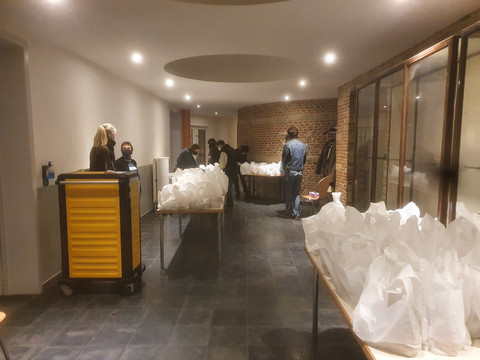[ad_1]

On a chilly Monday evening in early December, 45-year old Piera entered a food bank in the centre of Belgium’s capital city, Brussels.
An Italian national, Piera had spent three years homeless on the streets of Brussels before finding her way back into a job and an apartment.
Soft-spoken and smiling, she keeps returning to a place that welcomes those struggling to get by, with both food and camaraderie.
“They gave me a lot of help,” she says of Kamiano, which hands out food to people in need twice a week in a foyer attached to Sant’Egidio church.
Piera provided her last name but asked not to have it published. She had left Italy in 2014 for Belgium and found herself homeless, she says.
“I worked for a bit but my boyfriend had an accident and ended up in a wheelchair,” she says.
Around that same year, the Belgian state had issued over 2,000 eviction orders to EU nationals.
The orders effectively stripped people of all and any access to social benefits, including housing and health. Even those that had worked and paid into the system were told to leave.
Jean-Michel Lafleur, a professor of ethnic and migration studies at the University of Liège in Belgium, suspects the Belgian orders most likely left some EU nationals homeless.
It is unclear if Piera was among them.
Eventually, the European Commission took the Belgian government to court for abusing the system. Last year, the government dropped the orders to 600.
But Kamiano, an initiative of the Sant’Egidio community, is not just a place where people come for food. Piera, like others, return time and again for the friendships they have fostered over the years.
“We are not here to judge. We are here to be together, to support each other,” says 70-year old Nail, a Turkish national who also asked not have his full name disclosed.
A street musician who plies his trade on Place de l’épée, Nail has been coming to the centre for years. His son, he says, lives in London. His backstory or the circumstances that led to his situation was not explained.
“We know the names of everyone who comes here,” says Tim de Mey, a 46-year old Belgian from Antwerp who coordinates Kamiano.
EUobserver visited Kamiano twice for this story and spoke to a half dozen people.
Both times, lines of people had gathered outside in order to collect their bags of food.
Among them was 45-year old Romanian national who gave his name as Cezar Strat.
“I have asked for help from the community services, but there is nothing,” he says, noting he needs only €50 a week.
Strat had lost his mechanic job in February due to Covid and now sleeps in the garage of his former employer.
“I can’t go home because of the pandemic,” he says, when asked.
‘Friendship sauce’
Almost everyone who comes to Kamiano picks up a small white bag of food and leaves.
But a limited number are allowed inside, navigating between two large green tents before passing through a door flocked by statutes of the Virgin Mary.
Inside, a hall is decorated with a Christmas tree and five large tables seat four people each. Sanitary precautions, including hand sanitisers, face masks and social distancing measures, are respected.
The coordinator, de Mey, is keeping operations running smooth as he directs volunteers – making sure the food is handed out properly.
“We give food but we put a lot of good friendship sauce on it,” says de Mey, smiling.
“I have five, six friends, that I call friends today, who don’t need to come here anymore,” he says.
Among them is a chief engineer of a large firm, he says, who was homeless 15 years ago.
De Mey says the poverty caused by Covid-19 means more people are going hungry.
The problem is also manifested elsewhere. Services once offered to the homeless have been been restricted or shut down because of the pandemic, he says.
The Belgian state does not help Kamiano.
Instead, it is mostly financed through small private donors, many of them monthly payments of around €25. And it is run by volunteers as part of a wider Catholic church network.
Every Monday and Thursday, it hands out around 80 meals prepared by a Belgian restaurant chef, Elliott Van de Velde.
On the menu: asparagus soup for a starter with tortellini with ricotta and parmesan plus a half baguette as the main. Desert options included rice pudding, chocolate, fruits, and speculoos crumble pie.
Van de Velde co-runs the Hearth Project, which aims to prevent food waste.
It uses surplus food stacked in distribution centres, produce that is set to expire, and vegetables that don’t conform to market expectations of shape and size.
“He creates these marvellous meals for a nice price,” says de Mey.
Will they close for Christmas Day?
No, he says noting they expect at least 20 people every half hour.
“We will prepare something Christmasy,” he says.
[ad_2]
Source link